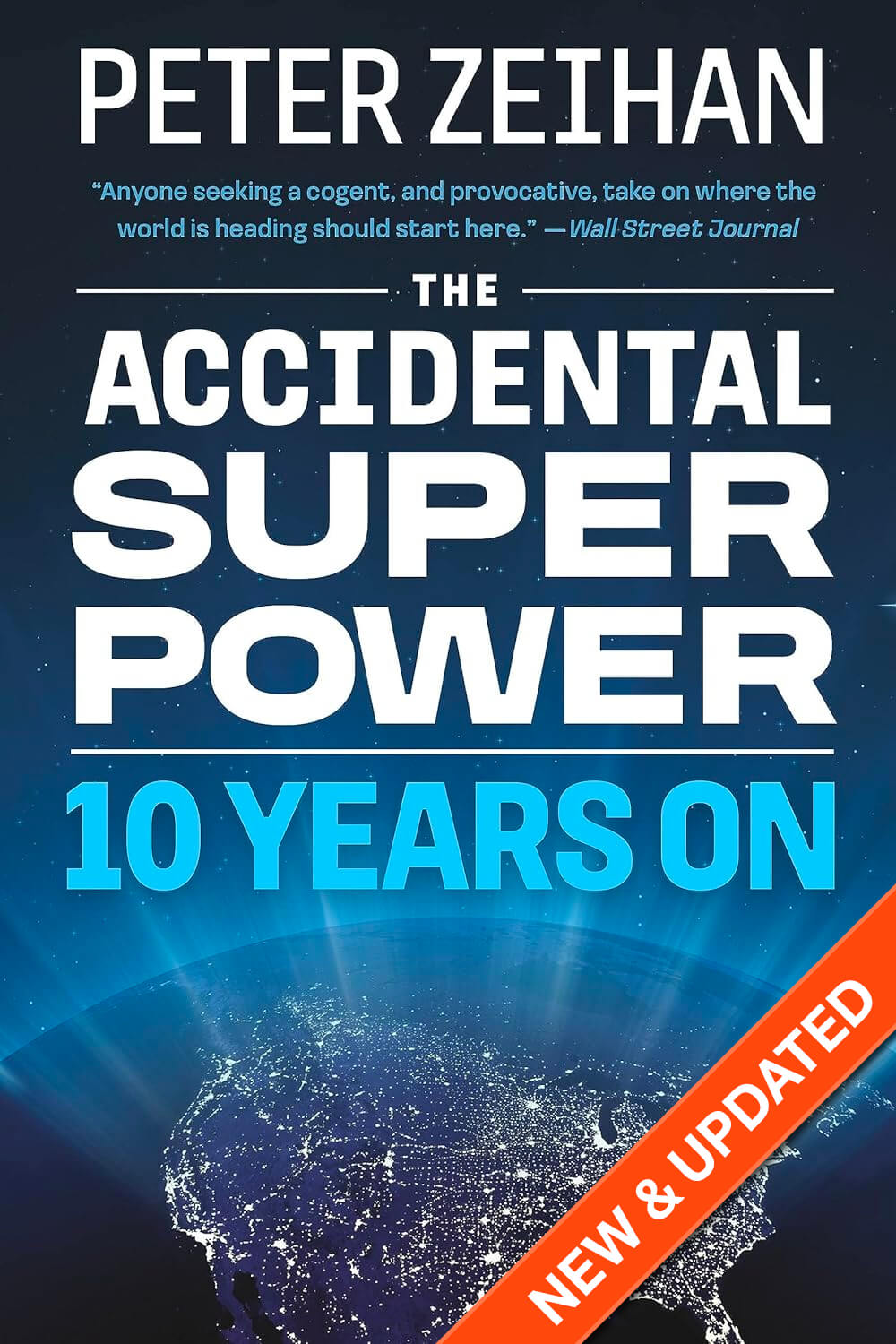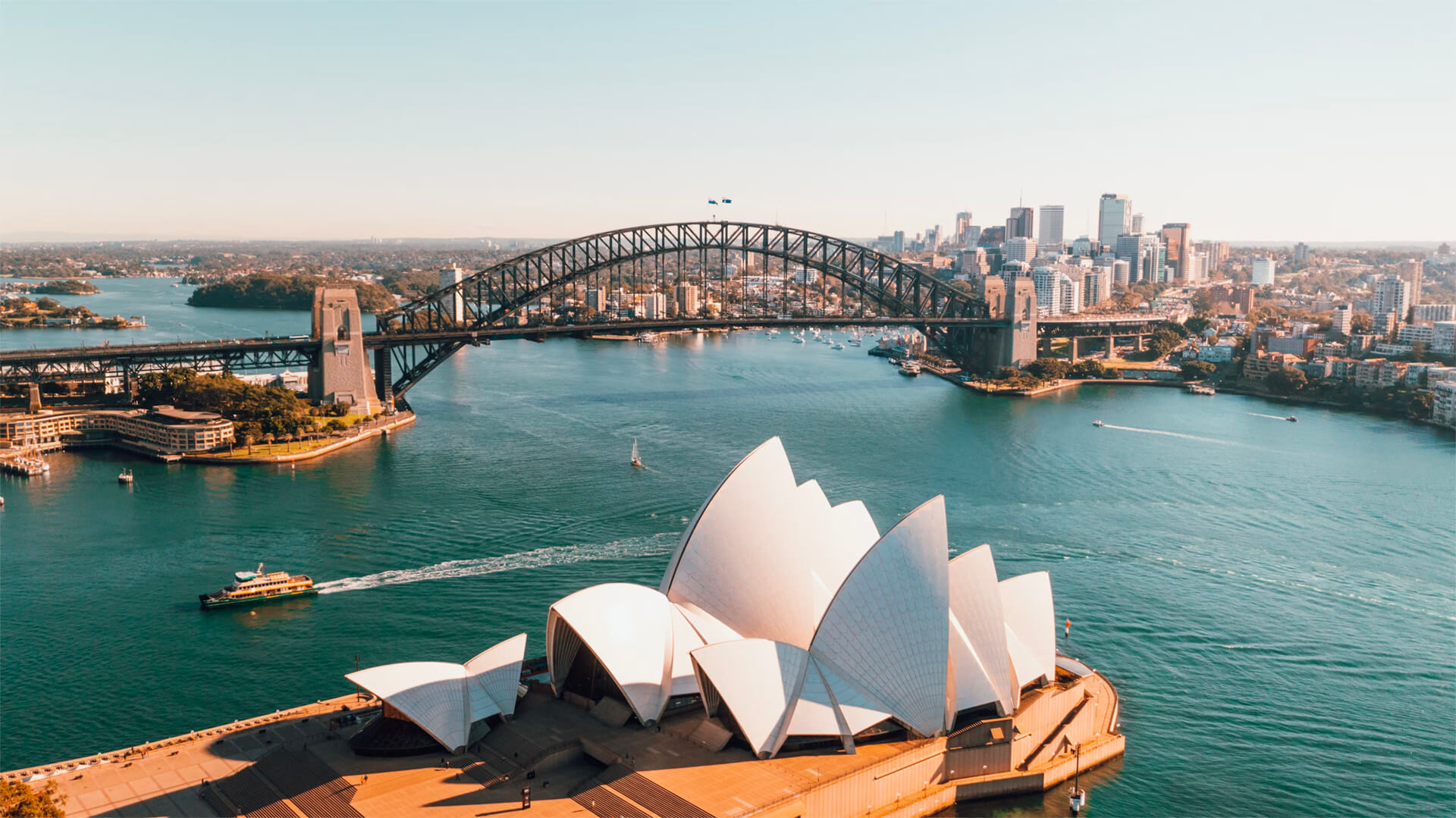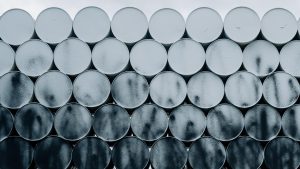FOR MORE ON THE FUTURE OF Australia, SEE DISUNITED NATIONS

The Accidental Superpower: Ten Years On
With a new “10 years later” epilogue for every chapter, comes an eye-opening assessment of American power and deglobalization in the bestselling tradition of The World is Flat and The Next 100 Years.
We’re heading down under today, and we’re not here to f*** spiders. The Australians are one of the few countries that will stay under the United States’ wing as the Order collapses, but they have a few things to figure out first.
The Aussies have grown awfully close economically to the Chinese over the past few decades, so they’ll need to find some different customers. I’m sure the U.S. will make the list. Australia will also have to find a way to rapidly move up the value-add chain in terms of processing capabilities and capacity.
There’s also an Outback-sized sub-prime real estate issue that will trigger a financial crisis when it finally cracks…especially if all of these issues boil up at the same time.
Regardless, the Australians have got in good with the Americans, and they’re set to thrive in the deglobalized world. And the US isn’t mad about it either; they’re getting a creative and capable ally with plenty of the stuff that will be in high demand in the coming years.
Here at Zeihan On Geopolitics we select a single charity to sponsor. We have two criteria:
First, we look across the world and use our skill sets to identify where the needs are most acute. Second, we look for an institution with preexisting networks for both materials gathering and aid distribution. That way we know every cent of our donation is not simply going directly to where help is needed most, but our donations serve as a force multiplier for a system already in existence. Then we give what we can.
Today, our chosen charity is a group called Medshare, which provides emergency medical services to communities in need, with a very heavy emphasis on locations facing acute crises. Medshare operates right in the thick of it. Until future notice, every cent we earn from every book we sell in every format through every retailer is going to Medshare’s Ukraine fund.
And then there’s you.
Our newsletters and videologues are not only free, they will always be free. We also will never share your contact information with anyone. All we ask is that if you find one of our releases in any way useful, that you make a donation to Medshare. Over one third of Ukraine’s pre-war population has either been forced from their homes, kidnapped and shipped to Russia, or is trying to survive in occupied lands. This is our way to help who we can. Please, join us.
TranscripT
Hey everybody. Peter Zeihan here. Coming to you from above Ken Karl in Colorado today, we will do another session of the Post America series, specifically looking at all Australia. We’ve got four things going on with the Aussies as the world breaks down around it. Three are really a challenge and one is actually pretty impressive. So let’s start with the bad.
China trying to China is trying to. Trying to China. Australia is capable of a relatively two faced forward economic policy. They are tight, tight, tight allies with the United States. But at the same time they will ruthlessly exploit any economic opportunities that the American led security order has offered. And so all of the Western nations, Australia is absolutely the one that has gotten into bed the deepest with the Chinese economically.
Primarily as a raw commodities producer, whether it is bauxite or iron ore or natural gas, you name it, lithium. China has been far away. Their number one customer for most of these things for most of the last 40 years. And those numbers are only going up. And so when they have a spat with the Chinese, the Americans are like, you know, you’re our friend and we’re going to say nice things about you.
But, you know, when we said global economic order, what we we didn’t really mean for you to, like, go and just swallow everything that the Chinese put in your mouth. That’s going to be a problem moving forward, because a lot of the Chinese demand has never been economically viable. The Chinese have a hyper financialization system which basically prints money and confiscates bank deposits in order to fuel industrial development, even if it’s not something the Chinese are good at.
And something like that is fairly price insensitive and they will buy almost anything at any price if it furthers whatever the political goal is, which is usually to build infrastructure. An industrial plant in Australia has been arguably the single largest supplier to the Chinese this entire time. When that goes away and the Australians have to sell to more economically sane folks, it’s not like the market is going to collapse completely.
But this balls to the wall price insensitive expansion that they’ve seen in most of their spaces for the last few decades. That’s just not going to carry on. They will be able to replace the Chinese demand with demand elsewhere, especially as the U.S. industrialize is in the Southeast Asia. Kind of steps into some of those roles. But collectively, that will be nearly as big as what the Chinese have pulled from the Australian economy this whole time.
So that’s going to be a pretty harsh adjustment when it comes. The second problem is that the Australians never moved up the value added scale in the raw materials industry. They’ve always been a raw commodities provider, whether that has been the iron or they don’t produce steel or the lithium, they don’t produce batteries, the natural gas, they don’t produce chemicals, the wheat, they don’t produce flour.
And so basically the stuff is grown or pulled out of the earth and shipped off. And that’s the end of the story. And that industrial plant that the rest of the world has to build to replace China, some of that really needs to happen in Australia as well. And the time to start working on that was probably 1989.
They are so far behind. In fact, it’s only in the last year with the Inflation Reduction Act in the United States where the Australians have negotiated to kind of join the subsidies regime. So some American money will come into Australia to help build out the industrial plant for processing. But they should have been doing this in absolutely every product set that they produce decades ago.
And so when the processing capacity, which is concentrated in China goes offline, even if there is demand for the raw commodities, other place is going to have to build the processing capacity first. So that adjustment down in a post China environment is going to be a lot worse than it needs to be. The third problem is entirely homegrown.
You got to remember subprime. Well, the Australians had something that was much worse. The problem is they never fixed it. So you can say what you want about the American approach to subprime. We forced people who had made decisions whether they were banks or homeowners, to eat some of the losses in order to qualify for restitution funds from the Federal Government.
The Australians didn’t. They just guaranteed everyone’s loans. And so everything has just gotten deeper. It has festered for the last 15 years and arguably I think it’s conservatively, you could say that the subprime problem now is at least a factor of five in relative terms worse than what the United States went through. And so when that finally cracks.
And I would argue that a sharp d globalization shock or deep China ification would be more than enough to trigger a financial crisis in that sort of environment. They’re going to have something that’s at least a factor of five or worse than what the United States went through with subprime. And all three of these things, unfortunately, are probably going to hit them all at the same time.
So it’s not that Australia is looking at a recession, it’s that they’re looking at a depression that’s probably in the last a half a decade, and that’s going to be horrible. But let’s focus on the upside. This is the post-American series. This is what the world looks like when the United States steps back from maintaining sea lanes and gluts.
A lot of its alliances drop. Australia is not going to be dropped. Australia has always proven to be a creative and capable ally. They’ve formed international coalitions to unofficially achieve American policy. They were with us in Korea, they were with us in Vietnam. They were with us in Iraq and Afghanistan. They have always been among the first to belly up to the bar, realizing that the world that they live in and the security they have, the economy they have is only possible because of the strategic overwatch the United States has granted.
And that means Australia is also one of only very, very few countries who have ever gotten a free trade agreement with the United States. Not because we were sacrificing for security reasons. We granted them because they had been such a great friend for so long. And when we move into the post-American world, it’s not that the United States is going to do anything.
We are going to have some allies where the balance of commitment from us and the benefits of commitment from them make sense at the very, very, very, very top of that list is all struggling above Japan, above Singapore, above Canada, above Great Britain. Australia is first. And so no matter what shape the world takes as globalization ends, the Aussies know that we will have their backs because we know that they have ours.
And that means no matter how bad, the economic adjustment is going to be rooted in a free trade relationship. Now, with the United States. We know they will grow out of it because they have stuff that the world needs. They have stuff that we need. And I have no doubt that an ally as creative and capable as Australia is going to be able to apply that capability and that creativity to their own economic restructuring.
The question is, is whether they will start that process before the bottom falls out.








